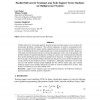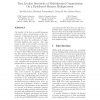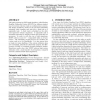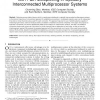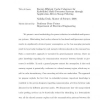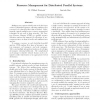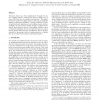JPDC
2007
15 years 1 months ago
2007
The core of current-generation high-performance multiprocessor systems is out-of-order execution processors with aggressive branch prediction. Despite their relatively high branch...
119
click to vote
JNW
2006
15 years 2 months ago
2006
The design of large dependable multiprocessor systems requires quick and precise mechanisms for detecting the faulty nodes. The problem of system-level fault diagnosis is computati...
132
click to vote
JMLR
2006
15 years 2 months ago
2006
Parallel software for solving the quadratic program arising in training support vector machines for classification problems is introduced. The software implements an iterative dec...
CORR
2010
Springer
15 years 2 months ago
2010
Springer
Identifying codes have been introduced in 1998 to model fault-detection in multiprocessor systems. In this paper, we introduce two variations of identifying codes: weak codes and ...
CASCON
1996
15 years 3 months ago
1996
The locality of the data in parallel programs is known to have a strong impact on the performance of distributed-memory multiprocessor systems. The worse the locality in access pa...
133
click to vote
EMSOFT
2008
Springer
15 years 3 months ago
2008
Springer
This paper presents an EDF-based algorithm, called Earliest Deadline Deferrable Portion (EDDP), for efficient scheduling of recurrent real-time tasks on multiprocessor systems. Th...
122
click to vote
HPCA
1995
IEEE
15 years 5 months ago
1995
IEEE
—Reducing communication latency, which is a performance bottleneck in optically interconnected multiprocessor systems, is of prominent importance. A conventional approach for est...
144
click to vote
DSD
2006
IEEE
15 years 5 months ago
2006
IEEE
Title of thesis: Energy-Efficient Cache Coherence for Embedded Multi-Processor Systems through Application-Driven Snoop Filtering Alokika Dash, Master of Science, 2006 Thesis dire...
113
click to vote
HPDC
1993
IEEE
15 years 6 months ago
1993
IEEE
Multiprocessor systems should exist in the the larger context of distributed systems, allowing multiprocessor resources to be shared by those that need them. Unfortunately, typica...
106
click to vote
PODC
1997
ACM
15 years 6 months ago
1997
ACM
Wait-free objects are often implemented through the use of a \helping scheme", whereby one process \helps" one or more other processes to complete an operation. This pap...

